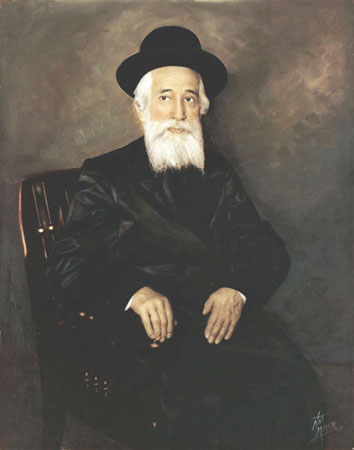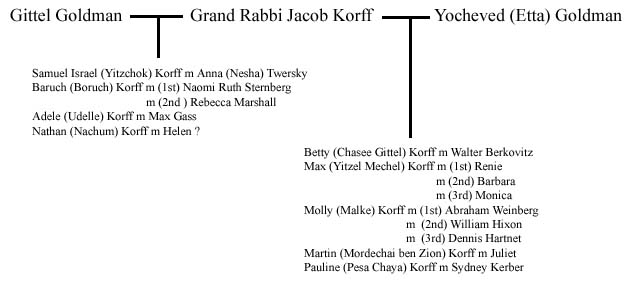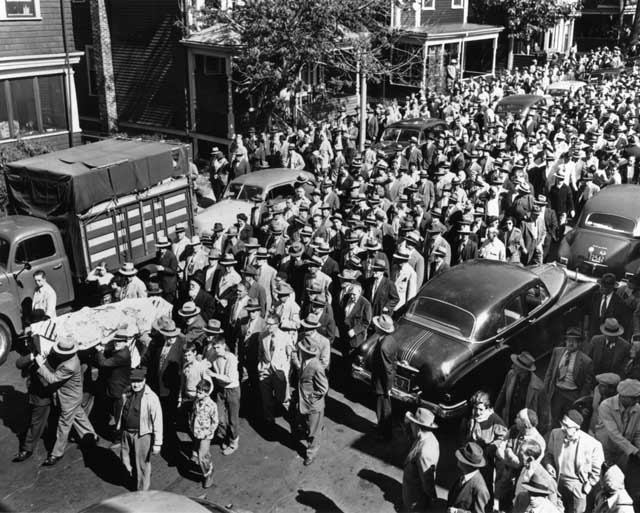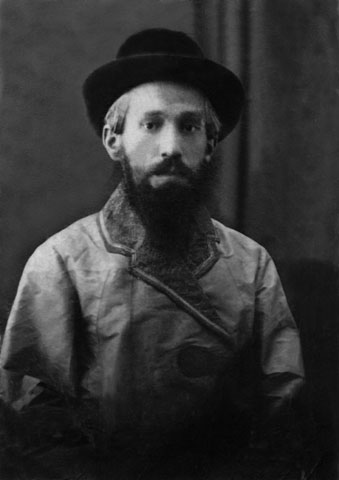
 |
GRAND RABBI JACOB ISRAEL KORFF: THE ZVILLER REBBE

 |
|
Thousands of mourners filled the streets of Dorchester during Grand Rabbi Korff’s funeral procession. |
When Grand Rabbi Jacob Israel Korff died in 1952 at his home in the Boston neighborhood of Dorchester, more than 5,000 mourners paid their respects, including Boston Mayor John Hynes and Massachusetts Governor Paul A. Dever. Boston had never seen such an outpouring of grief for a Jewish leader. Who was this Rabbi Korff and why was he so revered?
Jacob Israel Korff was born in Medzhibozh, Russia, on 26 Tishri 5643 (October 23, 1883), and became an esteemed leader of the Hasidic movement, first in Russia and later in America. Korff was part of a dynasty of rabbis that stretched back at least eight centuries and included the Ba'al Shem Tov, the Ba'al Shem Tov’s grandson Rabbi Baruch of Medzhibozh, and the Hasidic dynasties of the rebbes[1] of Medzhibozh, Chernobyl, Karlin, and Apte. Yet, Jacob’s ascension to Grand Rabbi of Zvil at the tender age of 24 created quite a stir:
“In the beginning of the [20th Century] he married Gitla, daughter of the tzaddik Rabbi Michaela [Yechiel Michel Goldman], the oldest son of the tzaddik Rabbi Mordichla of Zvil…After their marriage he settled in Zvil [known today as Novograd Volynsk], was supported for some years at his father-in-law’s table, and blessed his time learning Torah. In the meantime, Rabbi Michaela, relying on his standing in the town and his influence on a known part of the public, was laying the groundwork for his son-in-law to become rabbi of the town.
“This created a controversy among the people, not out of personal opposition to Rabbi Jacob Israel, but because they saw this as an insult to the judges of Zvil.
“After the death of Rabbi Moshe Shmuel [the last chief rabbi of Zvil] his position was to have been filled by his son and heir, Rabbi Yoel Hadin, who was working as a rabbi in Ranovka. He moved to Zvil, but because of his humility he didn’t agree to put the crown of chief rabbi on his head, and consequently none of the other rabbis dared to reach for the crown. [Note: The use of the term crown is metaphorical.]
“Even the oldest of the judges, Rabbi Alter, a judge of noble spirit and pure soul, who certainly was a distinguished rabbi…and for whom the cloak of the rabbinate was appropriate, recoiled from this office. And here appears a young man, who has not yet reached the years of strength (30), who is being made rabbi of such a large and important Jewish community... [Rabbi Korff was only 24 years old at the time.]
“This was an event that brought dissension to the city. [But] It was impossible to start a war against Rabbi Michaela, since his name and family heritage loomed large, and many rabbis and ordinary people depended on him.
“The establishment of Rabbi Jacob Israel Korff as a rabbi in the town became a fact. A young man with energy and initiative, he quickly captured the hearts of the residents and their opposition turned to friendship.” [2]
|
|
 |
|
According to his daughter, Adele, “Jacob Korff was a tiny man but his eyes seemed to talk. When people met him, they did not get a sense of power but detected a sense of humility.” |
Rabbi Korff in his younger days |
 |
|
|
Click here to listen to Adele Korff Gass’s talk about her Chasidic heritage. (Recorded November 9, 1992 in Winthrop, Massachusetts)
|
Zvil or Novograd
Volynsk? Click here for a word on place names.
[1] The term rebbe denotes a Hasidic grand rabbi. The term rebbe is often synonymous with tzaddik. (A tzaddik is a righteous man, a mediator between God and ordinary people. The Hasidic faithful believe that they can achieve salvation of their souls through their tzaddik.)
[2] Sefer Zvhil edited by Azriel Ori, Mordechai Boneh, and Yonatan Shelein. (Tel Aviv: Association of Former Residents of Zvhil and Environs, 1962). This yizkor (memorial book) book was written by various authors in Hebrew and Yiddish. Excerpts translated from the Hebrew by Edna Levy-Schreiber.